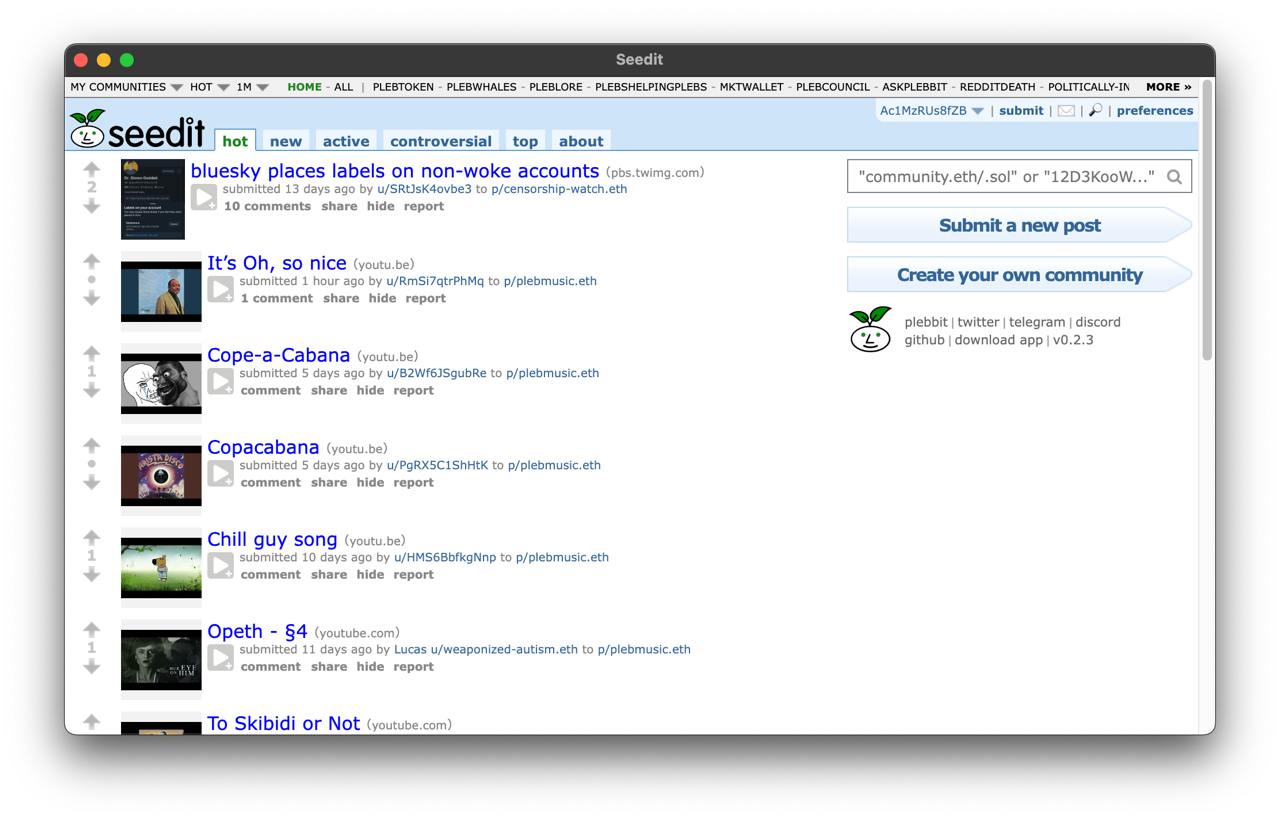implementing control over seeding is on the list of things to do, not yet implemented. same with private communities.
Plebbitor
Community moderation is the same as Lemmy/Reddit, Seedit community owners assign mods who have to keep the community clean, they can remove posts, mark them as nsfw/spoiler, ban users (from their community), banning a list of words or links to prevent users from publishing them, set up a mod queue (this is in the roadmap), etc.
It’s actually safer to run a community on Seedit, because it’s just a text file on IPFS that cannot include media files, and it’s not attached to any identity of the owner nor does it use centralized domains or SSL. There’s no IP logging, and the community owner can delete the community at any time, leaving no trace, since there’s no centralized database of communities.
And since all data is on IPFS, it’s not immutable, it can expire as soon as it has no more seeders. Compare this with blockchains, where text data is permanent, it can never be deleted once it’s in a block. Links to CSAM have been found in Bitcoin/Ethereum, and they can never get deleted.
Well, the name can be anything. Seedit is a client for the plebbit protocol, just like Lemmy is a client for ActivityPub protocol.
The same content that you see on Lemmy can be accessed from a different ActivityPub client, like Mastodon.
The same content that you see on Seedit can be accessed from a different plebbit client, like Plebchan. Plebbit will have countless clients, ie. different interfaces for the same data, each with a different name/branding/design.
Blockchains are perfect for anything that needs to be a token in an immutable ledger, such as domain names. We use them as extra, they are not needed but they are nice to have, to show a readable-name.eth or readable-name.sol instead of a long alphanumeric string, as address for plebbit communities and users.
Because lemmy is federated, it's not decentralized. Instances run on centralized servers, using DNS, they can get deplatformed at any time and delete your data. They effectively work just like regularly centralized websites, and can block each other. Whereas on plebbit, each community is a node that can't get deplatformed (works like torrents, ie no domain/DNS/SSL) and users connect to it p2p. So, to run a lemmy instance, you have to run a whole site, whereas to run a plebbit node you just have to open the desktop app and browse the site with it. Creating a sub with your node is free, just like creating a torrent file.
We constantly back up all our code, yes. If our GitHub repos ever get taken down, we'll just switch to GitLab, Codeberg or Radicle.
old.reddit was open source, also seedit is fully open source under GPLv2 license and it can't get taken down (it's serverless, and it's hosted on IPFS)
edit: also, for example, there's old.lemmy.world
Cool. If you want your subplebbit to be featured in our apps, ie shown in the homepages with all our users auto-subscribed to it, DM us its address or open a pull request on https://github.com/plebbit/temporary-default-subplebbits
At the moment, the only requirement is 99% uptime (and the sub shouldn't be about illegal stuff ofc, but it can be nsfw)
Yeah, we need better communities, most of them are poorly maintained at the moment. But some of them are cool, like technopleb.eth, plebpiracy.eth, plebmusic.eth, movies-and-anime.eth. You can check out the full list on https://seedit.app/#/communities/vote (this is a maintained list of default subs to show in the app, but you can connect p2p to any sub whatsoever if you know its address, just like you can download any torrent with a torrent client)
spam
each subplebbit has its own admins, who set up an anti-spam challenge which gets sent p2p to users when they publish to the sub. The cool thing is these challenges can be anything that can be code (anything: including PoW if they want to get spammed, or SMS auth, a captcha, a whitelist, a password, a time-based or usage-based challenge, biometrics to fight AI like worldcoin, whatever regularly centralized social media sites will end up using to fight spam)
csam
all data on plebbit is text-only, you cannot upload media. All media you see is embedded from centralized websites, with direct links, meaning if you post a link to csam from some site like imgur, imgur will ban you, take down the media (the embed returns 404, media disappears) and report your IP address to authorities. Plebbit is also not private, it works like torrents, your IP is in the swarm (even though the app and community can't see it, authorities can track it and figure out what you seeded, just like with torrents)
Seedit is fully p2p, it’s not federated, meaning there’s no “instances” in the federated sense. You just download the app or go to seedit.app, connect directly to a community, using its address, and you publish to it. It’s like torrents, you’re also seeding back content you receive (that’s why it’s called seedit, but seeding is fully automated at the moment, maybe it will be possible to selectively seed communities in the future)




It was supposed to be a lot more decentralized than Lemmy. Plebbit was built around a p2p protocol and the idea was that it wouldn’t rely on servers, everything would be fully serverless and self-hosted in a true decentralized way. What made it interesting was that it was planned to support multiple UIs, so people could use different frontends like their own version of Lemmy’s UI, or even something totally custom. A Lemmy style UI was even on their roadmap.
But the problem is... it never really happened. It’s been super slow because there are only like 3 devs working on it, and they’ve been trying to find more help for ages. The MVP still hasn’t come out, and I think the crypto side of it just scared people off or made things harder. I really believed in the idea at first, but now it just feels like vaporware.